通用版 小升初英语总复习课件--词法课件(共61张PPT)
文档属性
| 名称 | 通用版 小升初英语总复习课件--词法课件(共61张PPT) |  | |
| 格式 | pptx | ||
| 文件大小 | 623.3KB | ||
| 资源类型 | 试卷 | ||
| 版本资源 | 通用版 | ||
| 科目 | 英语 | ||
| 更新时间 | 2023-08-11 10:50:08 | ||
图片预览


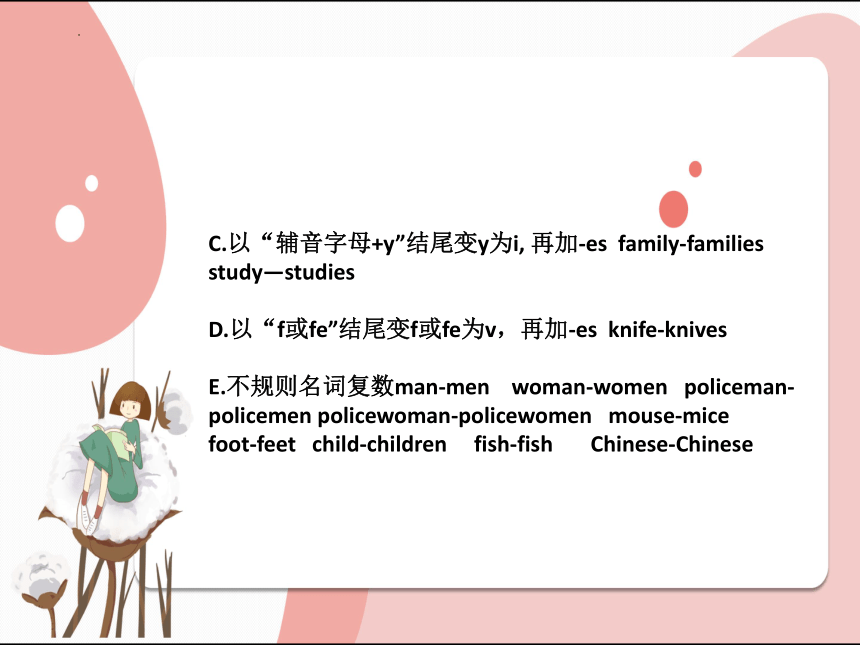

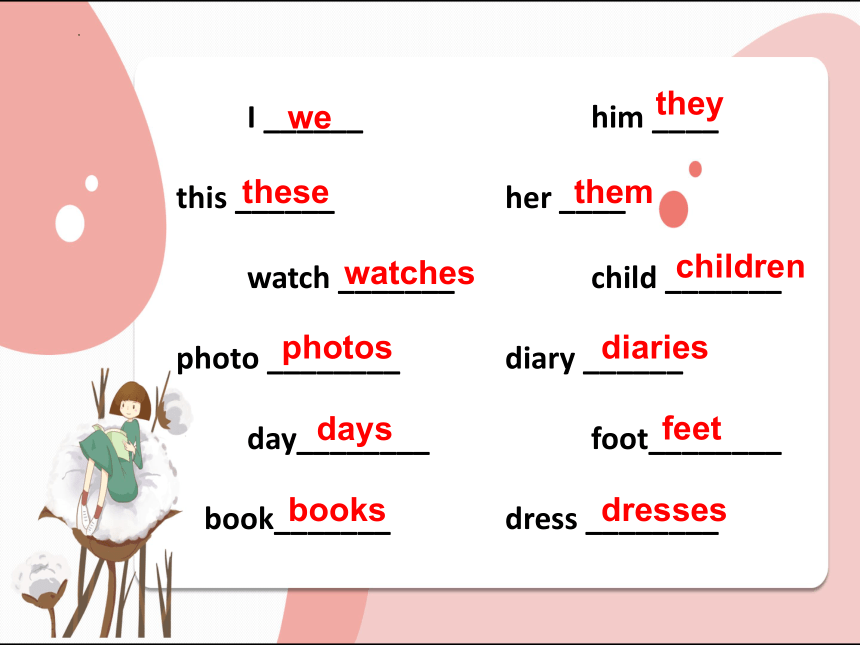
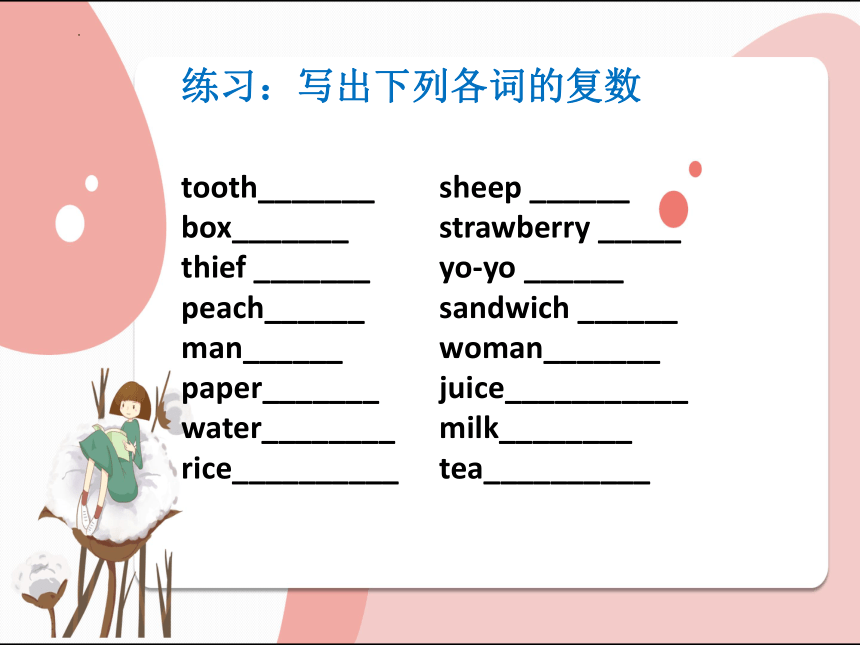

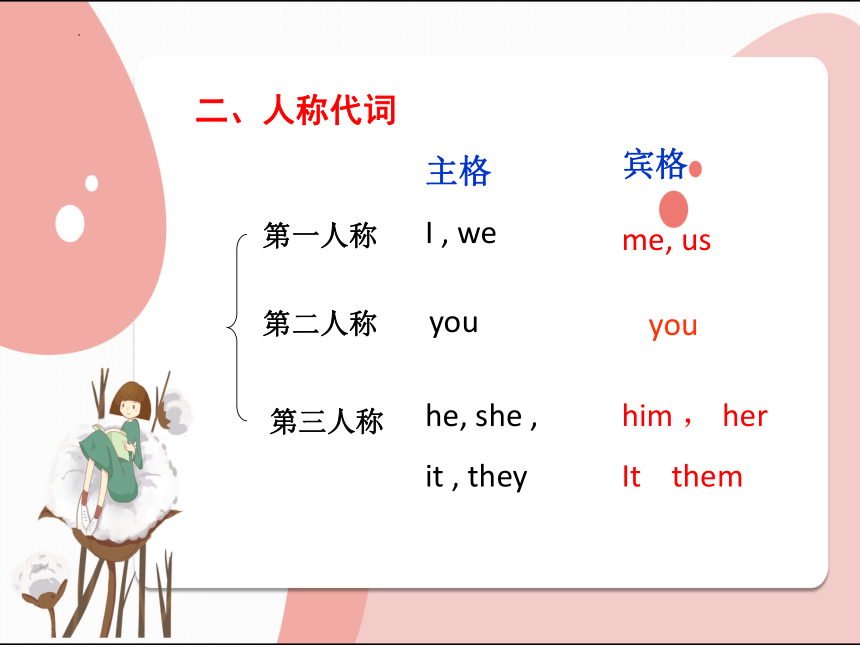
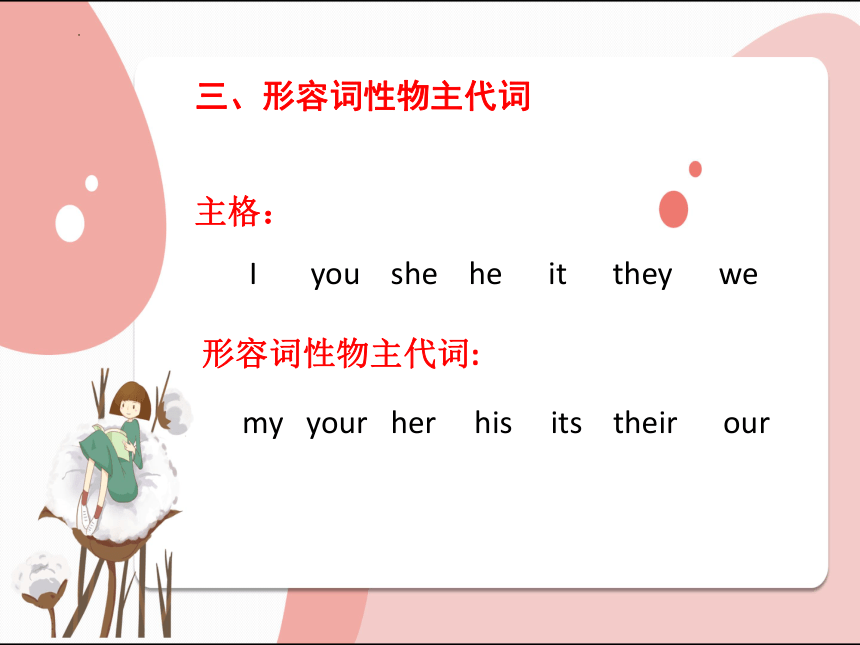
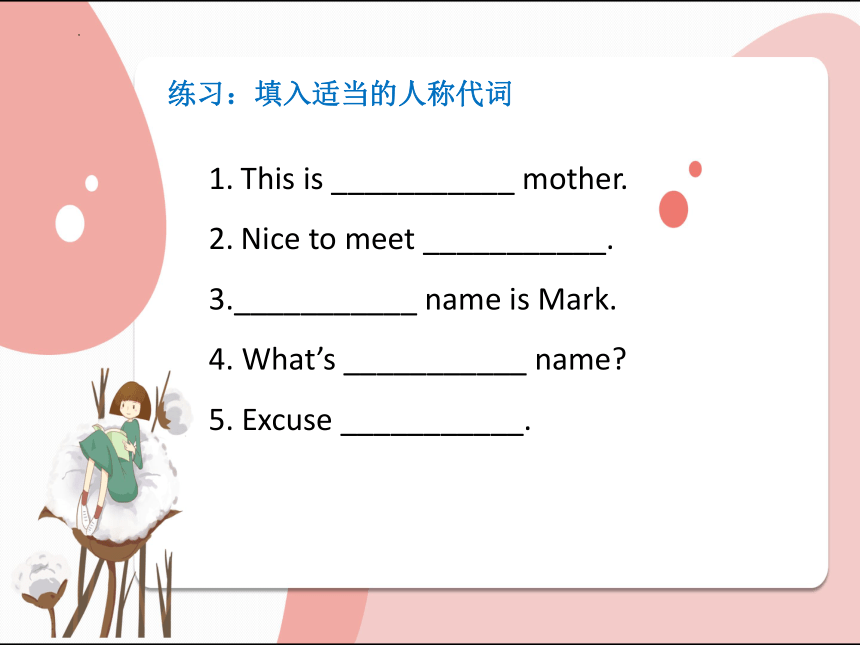
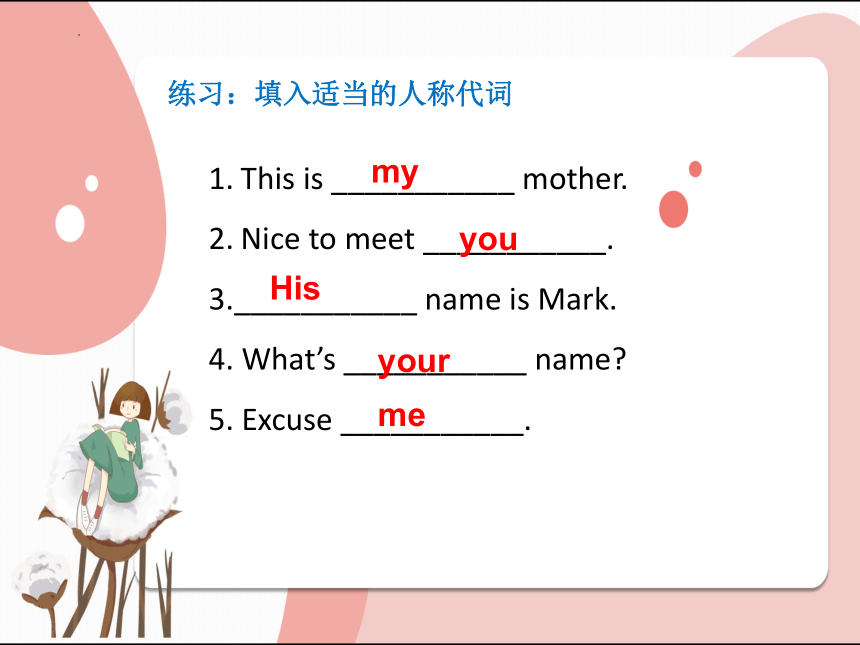
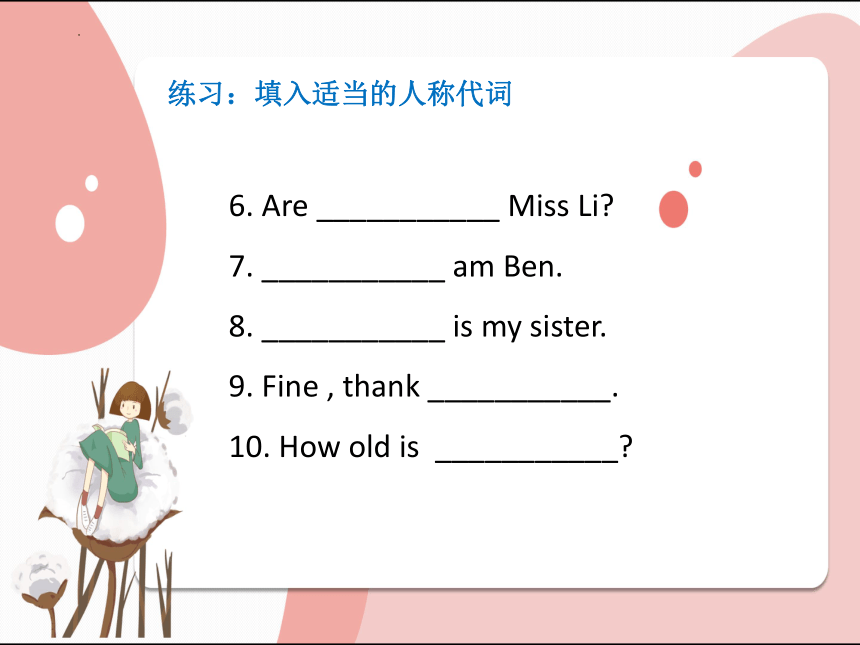
文档简介
(共61张PPT)
小升初语法总复习
--词法
一、词类:
一、名词
这里强调一点:不可数名词都默认为单数,所以总是用 is
名词复数如何加后缀(各种不同情况变化)
A.一般情况直接加-s
book-books bag-bags cat-cats bed-beds
B.以s. x. sh. ch结尾加-es :bus-buses box-boxes
brush-brushes watch-watches peach—peaches
glass—glasses
一、词类:
C.以“辅音字母+y”结尾变y为i, 再加-es family-families study—studies
D.以“f或fe”结尾变f或fe为v,再加-es knife-knives
E.不规则名词复数man-men woman-women policeman-policemen policewoman-policewomen mouse-mice
foot-feet child-children fish-fish Chinese-Chinese
练习:写出下列各词的复数
I _________ him ________
this ___________ her ______
watch _______ child _______
photo ________ diary ______
day________ foot________
book_______ dress ________
I ______ him ____
this ______ her ____
watch _______ child _______
photo ________ diary ______
day________ foot________
book_______ dress ________
them
these
watches
photos
days
books
they
we
children
diaries
feet
dresses
练习:写出下列各词的复数
tooth_______ sheep ______
box_______ strawberry _____
thief _______ yo-yo ______
peach______ sandwich ______
man______ woman_______
paper_______ juice___________
water________ milk________ rice__________ tea__________
tooth_______ sheep ______
box_______ strawberry _____
thief _______ yo-yo ______
peach______ sandwich ______
man______ woman_______
paper_______ juice___________
water________ milk________
rice__________ tea__________
teeth
sheep
boxes
strawberries
thieves
yo-yoes
peaches
sandwiches
men
women
papers
juice
water
milk
rice
tea
二、人称代词
第三人称
第二人称
第一人称
I , we
主格
you
he, she ,
it , they
me, us
you
宾格
him , her
It them
三、形容词性物主代词
I you she he it they we
主格:
my your her his its their our
形容词性物主代词:
This is ___________ mother.
Nice to meet ___________.
3.___________ name is Mark.
4. What’s ___________ name
5. Excuse ___________.
练习:填入适当的人称代词
This is ___________ mother.
Nice to meet ___________.
3.___________ name is Mark.
4. What’s ___________ name
5. Excuse ___________.
练习:填入适当的人称代词
my
you
His
your
me
6. Are ___________ Miss Li
7. ___________ am Ben.
8. ___________ is my sister.
9. Fine , thank ___________.
10. How old is ___________
练习:填入适当的人称代词
6. Are ___________ Miss Li
7. ___________ am Ben.
8. ___________ is my sister.
9. Fine , thank ___________.
10. How old is ___________
练习:填入适当的人称代词
you
I
She
you
he/she
四、指示代词
指近处:单数this (这个)
复数these(这些)
指远处:单数that (那个)
复数those(那些)
五、冠词
a、an、the。a和an的区别:
an用于元音音素(一般就是元音字母a、e、i、o、u)前
a用于辅音音素前。
六、形容词和副词的比较级
(一)形容词的比较级
1.形容词比较级在句子中的运用:两个事物或人的比较用比较级,比较级后面一般带有单词than。比较级前面可以用more, a little 来修饰表示程度。than后的人称代词用主格(口语中可用宾格)。
2.形容词加er的规则:一般在词尾加er ;以字母e 结尾,加r ;
3.以一个元音字母和一个辅音字母结尾,应双写末尾的辅音字母,再加er ;“辅音字母+y”结尾,先把y变i,再加er 。
4.不规则形容词比较级: good-better, beautiful-more beautiful
(二)副词的比较级
1.形容词与副词的区别 (有be用形,有形用be;有动用副,有副用动)
(1)在句子中形容词一般处于名词之前或be动词之后
(2)副词在句子中最常见的是处于实义动词之后
2.副词比较级的变化规则基本与形容词比较级相同 (不规则变化:well-better, far-farther)
练习
根据句意填入单词的正确形式:
1. My brother is two years __________(old) than me.
2. Tom is as ________(fat) as Jim.
3. Is your sister __________(young) than you Yes, she is.
1. My brother is two years __________(old) than me.
2. Tom is as ________(fat) as Jim.
3. Is your sister __________(young) than you Yes, she is.
older
fat
younger
4. Who is ___________(thin), you or Helen Helen is.
5. Whose pencil-box is __________(big), yours or hers Hers is.
4. Who is ___________(thin), you or Helen Helen is.
5. Whose pencil-box is __________(big), yours or hers Hers is.
thinner
bigger
6. Mary’s hair is as __________(long) as Lucy’s.
7.Ben ______ (jump) ________ (high) than some of the boys in his class.
8.________ Nancy sing __________ (well) than Helen Yes, she _____.
6. Mary’s hair is as __________(long) as Lucy’s.
7.Ben ______ (jump) ________ (high) than some of the boys in his class.
8.________ Nancy sing __________ (well) than Helen Yes, she _____.
long
jumps
higher
Does
better
does
9.Fangfang is not as _________ (tall) as the other girls.
10.My eyes are __________(big) than ________ (she)..
11.Which is ___________(heavy), the elephant or the pig
12.Who gets up _________(early), Tim or Tom
二、否定句
be动词(am、is、are)+not、
情态动词can+ not、
助动词(do、does) + not
如何将一个肯定的陈述句改为否定句:
1.看句中有无be动词,如有,直接在be动词后+ not。
2.看句中有无情态动词,如有,直接在情态动词后+ not。
3.如上述二者都没有,就应用助动词+ not。
三、一般疑问句
(1)肯定陈述句中本来是没有助动词的,要加上去,位置在主语(某人或某物)后,动词前。
(2)确定助动词用do、does,根据句中动词,动词是原形的助动词就用do,动词是第三人称单数的助动词就用does,
(3)在助动词后加not。
(4)原句中动词假如发生变化就要恢复成原形。
强调一点,有some的要考虑是否要用any。
常用疑问词 :
What time 什么时间 问具体时间,如几点
Who谁问人 Whose 谁的问主人
Where在哪里问地点
What 什么问东西、事物
What colour什么颜色问颜色
How old多大年纪问年纪
How many多少数量(可数名词)问数量
How much多少钱;多少数量(不可数名词)问多少钱或数量(不可数)
五 时态(一):一般现在时
用法:经常性的和习惯性的动作
常用时间状语 : usually, sometimes, in spring, every day, in the morning
动词构成 :动词原型. work
动词+S.(主语是第三人称单数)works
否定构成 : don’t+动原
doesn’t+动原
一般疑问构成及简答:
Do+主语+动原+其它?Yes,I do.
Does+主语+动原+其它?No,he doesn’t.
特殊疑问举例 :
1. What do you often do on Sundays
2. Where does he live
1. She ______________ (go) to school at eight o’clock.
2. It’s six o’clock. They are _____________ supper. (eat)
3. He usually ___________ up at 17:00.(get )
4. She ___________ (live) in Beijing.
5. Sally _________ (be) here just now. (刚才)
6. _______ (be) there a fly (苍蝇) on the table just now
7. They are __________ (dig) a hole (洞).
8. My father _______________ (mend) his model(模型) plane these days
用法:说话时正在进行的动作或当 前一段时间正在进行的动作
常用时间状语 :now, these days
动词构成 : am/is/are+现在分词(--ing)
am/is/are working
否定构成 : am/is/are+not+现在分词
For example: Tom is playing football on the playground.
用括号内所给动词的适当形式填空。
1. Look! The children ________(swim) in the river.
2. Now we ________(want) to play basketball.
3. -________you ________(draw) a picture
-No, I'm not. I ________(write) a letter.
4. What are you _________(do) now I ___________(eat) bread.
5. It’s nine o’clock. My father_______________ (work) in the office.
一般疑问构成及简答:
Am/Is/Are+主语+现在分词+ 其它?
Yes, I am (he is.) /No, they aren’t
特殊疑问举例:
What are you doing now
Who is flying a kite there
6. Look, the boy____________ (put) the rubbish into the bin.
7. __________ he __________(clean) the classroom No, he isn’t.
He____________ (play).
8. Where is Mark He___________ (run) on the grass.
9. Listen, who ____________(sing) in the music room Oh,
10. Look! LiPing and Li Ying ________(play) basketball now.
一般过去时
用法:过去时间发生的或过去经常性的动作
常用时间状语:yesterday,last night,two days ago, in 2000,at that time,before liberation,when 等引导的含 过去时的句子。
动词构成:动词过去时(-ed) worked work
否定构成:didn’t+动原 didn’t work
一般疑问构成及简答举例:Did+主语+动原+其它? Yes,主语+did./No, 主语+didn’t.
一般疑问构成及简答举例:Did+主语+动原+其它? We went to the cinema yesterday.
Did you go to the cinema yesterday
特殊疑问句举例:
What did he do yesterday
When did he get up this morning
备注:He opened the door.(不能确定门现在是否开着)
练习
一、 用be动词的适当形式填空
1. I _______ at school just now.
2. He ________ at the camp last week.
3. We ________ students two years ago.
4. They ________ on the farm a moment ago.
5. Yang Ling ________ eleven years old last year.
6. There ________ an apple on the plate yesterday.
7. There ________ some milk in the fridge on Sunday.
8. The mobile phone _______ on the sofa yesterday evening.
二、 句型转换
1. It was exciting.
否定句:__________________________________一般疑问句:__________________________________
肯、否定回答:__________________________________
2. All the students were very excited.
否定句:__________________________________一般疑问句:__________________________________
肯、否定回答:________________________
一般将来时
用法:将来会出现或发生的动作
常用时间状语:this evening, tomorrow, next month, in a few minutes, at the end of this term
动词构成:
1.will/shall+动原
2.am/is/are going to+动词原型
3.sm/is/are(about)+动词不定式
4.am/is/are+coming等现在分词
否定构成:will/shall not do/ a m/is/are not going to do
特殊疑问句举例:
What will you do tomorrow
When are we going to have a class meeting
备注:在if条件或as soon as等时间状语从句中用一般现在时代替一般将来时。
I will write to you as soon as I arrived in Beijing.
练习
填空。
1. 我打算明天和朋友去野炊。
I_____ _______ _________ have a picnic with my friends.
I ________ have a picnic with my friends.
2. 下个星期一你打算去干嘛 我想去打篮球。
What ________ ________ _________ _________ _________ next Monday
I _______ ______ _____ play basketball.
What _________ you do next Monday I ________ play basketball.
3. 你妈妈这个周末去购物吗?是,她要去买一些水果。
_____ your mother _______ ________ go shopping this ___________
Yes, she _________. She ______ ________ __________ buy some fruit.
4. 你们打算什么时候见面。
六下复习资料---单词归类
动物类:
ant蚂蚁 fish鱼 goose鹅 sheep羊 horse马 hen母鸡
lamb小羊 goat山羊 cow母牛 d&#111nkey驴 cat猫
rabbit兔子 pig猪 duck鸭 dog狗 kangaroo袋鼠
lion狮子 snake蛇 tiger虎 zebra斑马 fox狐狸 deer鹿
giraffe长颈鹿 elephant象 mouse老鼠 ox牛 dragon龙
seal海豹 sperm whale抹香鲸 squid鱿鱼 shark鲨鱼
衣服类:
jacket夹克衫 shirt衬衫 skirt裙子 dress连衣裙
T-shirt短袖 jeans 牛仔裤 pants长裤 socks袜子
shoes鞋子 shorts短裤 sneakers胶底鞋 slippers拖鞋
sandals凉鞋 boots靴子 vest背心
交通工具:
car小汽车 jeep吉普车 taxi出租车 bus公共汽车
bike自行车 boat 小船 plane飞机 train火车
ship轮船 subway地铁
天气:
Warm暖和 cold 寒冷 cool凉爽 hot 炎热
rainy 雨天 snowy 雪天 windy刮风天
cloudy 多云 sunny 晴天
蔬菜类:
tomato西红柿 potato马铃薯 onion洋葱
carrot胡萝卜mutton羊肉cabbage卷心菜
pork猪肉eggplant茄子 green beans扁豆
tofu豆腐 cucumber黄瓜
颜色类:
red红色 blue蓝色 brown棕色 orange橙色
yellow黄色 white白色 green绿色
pink粉红色 black黑色 grey灰色 purple紫色
人物类:
boy 男孩 girl 女孩 man 男人 woman 女人
baby 婴儿 children 儿童cousin 堂兄弟
uncle 舅舅 aunt 阿姨Father爸爸 mother 妈妈
grandmother 奶奶 grandfather 爷爷 sister 姐妹
brother 兄弟 son 儿子
职业类:
fammer 农夫 assistant 服务员
baseball player 棒球手 driver 司机doctor医生
nurse 护士 actor演员 teacher 教师
人体:
hair头发 ear耳朵 nose 鼻子 mouth 嘴巴
tooth 牙齿face 脸 arm 手臂 body 身体
leg 腿 finger手指 head 头 foot 脚 knee膝盖
neck 脖子 toe 脚趾
水果类:
apple苹果 banana 香蕉 pear 梨 orange 橘子
watermelon 西瓜 peach 桃子
strawberry 草莓 grape 葡萄 lemon柠檬
mango 芒果
食物类: (吃的,喝的)
egg 鸡蛋 ice 冰 ice-cream 冰淇淋 fish 鱼
noodles 面条 beef 牛肉vegetable 蔬菜
soup 汤bread 面包 milk 牛奶 water 水
chicken 鸡肉coffee咖啡 juice果汁 tea茶
数字类:
基数词:
One 一two二three 三four四five 五six 六 seven 七eight 八nine 九ten 十eleven十一twelve十二 fifteen十五 sixteen十六 seventeen 十七eighteen 十八nineteen十九 twenty二十 twenty-one 二十一 thirty-one三十一 four-one 四十一fifty-one 五十一sixty-one 六十一seven-one 七十一 eighty-one 八十一ninty-one九十一 hundred 一百
序数词:
first (1st) second (2nd) third (3rd)fourth (4th) fifth (5th) sixth (6th) seventh (7th) eighth (8th) ninth (9th) tenth (10th)eleventh (11th) twelfth(12th) thirteenth (13th) fourteen (14th) fifteenth (15th) sixteenth (16th) seventeen (17th) eighteenth (18th) nineteenth (19th) twentieth (20th)
课程类:
English class 英语课 Chinese class 语文课 math class数学课 P.E. class 体育课 art class 美术课computer class 电脑课 science class 自然课 music class 音乐课 Moral Education 思品课 Social Studies 社会课
礼貌用语:
Good morning! 早上好 Good afternoon! 下午好 Hello!你好 Hi!嗨 Bye-bye!再见 Nice to meet you ! Sorry !对不起 Please !请 Thank you !谢谢That’s OK!没关系 How are you ! 你好!
国家类:
USA 美国 CAN 加拿大 UK 英国 PRC 中国
电器类:
TV 电视 phone电话 fridge 电冰箱
形容词:
big 大的 small 小的 cheap 便宜的 expensive 贵的long 长的short 短的fat胖的 thin瘦的old 老的young 年青的sweet 甜 sour 酸 salty 咸pretty可爱的 colourful 多彩的 fresh 新鲜的 beautiful漂亮的 new 新的 strong 强壮的 quiet 安静的Cute 漂亮的 lovely 可爱的 tall 高的 funny 有趣的 kind 慈祥的 strict 严格的 smart 机灵的 active 活跃的 tasty 美味
物品:
Computer电脑 picture 图画 fan 电风扇 light 灯 board 黑板 window 窗户 door 门 floor 地板 classroom 教室 bed 床 sofa 沙发 shelf 书架 table 桌子 chair 椅子 knife 小刀 chopsticks筷子 spoon 调羹 plate 盘子 fork叉子 key 钥匙 toy玩具 umbrella雨伞 violin小提琴 piano钢琴 curtain 窗帘 trash bin 垃圾筒 closet 衣橱mirror 镜子 bag 书包 pencil 铅笔 pen 钢笔 book 书 ruler尺子 pencil-case 铅笔盒 walkman 随身听 lamp 灯 crayon蜡笔
动作:
Fly 飞sing 唱歌 cook 做饭 angry 生气play 玩耍 draw 画 jump 跳 watch 看 open 打开 guess 猜 taste 品尝 send 发送walk 走swim 游泳 run跑 sleep 睡 fight 打架 swing 荡秋千 drink 喝 count 数数 write 写 catch 捉 clean 大扫 read 读 see 看 listen 听eat 吃 run 跑 visit 参观 happy高兴 angry生气 bored 厌烦 tired 累 sad 伤心 excited 激动dance 跳舞 climb 爬 learn 学 go 去 study 学习
方位介词:
in 在什么里面 on 在什么上面 under在什么下面behind 在什么后面near 在什么旁边 over 在什么正上方 in front of 在什么前面
房间:
teacher’s desk 讲台 wall 墙壁 playground 操场 garden 花园 teacher’s office教师办公室 library 图书馆canteen 餐厅 art room 美术室 camputer room 电脑室 washroom 洗手间 music room 音乐室 gym 体育馆 TV room 电视房 study 书房 bedroom 卧室 living room 客厅 kitchen 厨房
疑问词:
疑问词是疑问代词“who, whom, what,which, whose”和疑问副词“when, where, how, why ”。when什么时候 whose谁的 where在哪里 which哪一个 why为什么 who谁 what什么 what time什么时间 what colour 什么颜色 what about…怎么样 what day星期几 what date什么日期 what for为何目的 how…怎么样 how old多大 how many多少 how much多少 how about…怎么样 how far多远
月份:
January(Jan.)一月;February(Feb.)二月;
March(Mar.)三月; April(Apr.)四月;
May五月; June(六月; July七月;
August(Aug.)八月; September(Sept.)九月;
October(Oct.)十月; November(Nov.)十一月;
December(Dec.)十二月
星期:
Monday Mon.星期一 Tuesday Tue. 星期二 Wednesday Wed.星期三 Thursday Thu. 星期四 Friday Fri. 星期五Saturday Sat.星期六Sunday Sun.星期天(日)
单词汇总
Book 8 Summary of Lessons 1-6
同学们 再见
小升初语法总复习
--词法
一、词类:
一、名词
这里强调一点:不可数名词都默认为单数,所以总是用 is
名词复数如何加后缀(各种不同情况变化)
A.一般情况直接加-s
book-books bag-bags cat-cats bed-beds
B.以s. x. sh. ch结尾加-es :bus-buses box-boxes
brush-brushes watch-watches peach—peaches
glass—glasses
一、词类:
C.以“辅音字母+y”结尾变y为i, 再加-es family-families study—studies
D.以“f或fe”结尾变f或fe为v,再加-es knife-knives
E.不规则名词复数man-men woman-women policeman-policemen policewoman-policewomen mouse-mice
foot-feet child-children fish-fish Chinese-Chinese
练习:写出下列各词的复数
I _________ him ________
this ___________ her ______
watch _______ child _______
photo ________ diary ______
day________ foot________
book_______ dress ________
I ______ him ____
this ______ her ____
watch _______ child _______
photo ________ diary ______
day________ foot________
book_______ dress ________
them
these
watches
photos
days
books
they
we
children
diaries
feet
dresses
练习:写出下列各词的复数
tooth_______ sheep ______
box_______ strawberry _____
thief _______ yo-yo ______
peach______ sandwich ______
man______ woman_______
paper_______ juice___________
water________ milk________ rice__________ tea__________
tooth_______ sheep ______
box_______ strawberry _____
thief _______ yo-yo ______
peach______ sandwich ______
man______ woman_______
paper_______ juice___________
water________ milk________
rice__________ tea__________
teeth
sheep
boxes
strawberries
thieves
yo-yoes
peaches
sandwiches
men
women
papers
juice
water
milk
rice
tea
二、人称代词
第三人称
第二人称
第一人称
I , we
主格
you
he, she ,
it , they
me, us
you
宾格
him , her
It them
三、形容词性物主代词
I you she he it they we
主格:
my your her his its their our
形容词性物主代词:
This is ___________ mother.
Nice to meet ___________.
3.___________ name is Mark.
4. What’s ___________ name
5. Excuse ___________.
练习:填入适当的人称代词
This is ___________ mother.
Nice to meet ___________.
3.___________ name is Mark.
4. What’s ___________ name
5. Excuse ___________.
练习:填入适当的人称代词
my
you
His
your
me
6. Are ___________ Miss Li
7. ___________ am Ben.
8. ___________ is my sister.
9. Fine , thank ___________.
10. How old is ___________
练习:填入适当的人称代词
6. Are ___________ Miss Li
7. ___________ am Ben.
8. ___________ is my sister.
9. Fine , thank ___________.
10. How old is ___________
练习:填入适当的人称代词
you
I
She
you
he/she
四、指示代词
指近处:单数this (这个)
复数these(这些)
指远处:单数that (那个)
复数those(那些)
五、冠词
a、an、the。a和an的区别:
an用于元音音素(一般就是元音字母a、e、i、o、u)前
a用于辅音音素前。
六、形容词和副词的比较级
(一)形容词的比较级
1.形容词比较级在句子中的运用:两个事物或人的比较用比较级,比较级后面一般带有单词than。比较级前面可以用more, a little 来修饰表示程度。than后的人称代词用主格(口语中可用宾格)。
2.形容词加er的规则:一般在词尾加er ;以字母e 结尾,加r ;
3.以一个元音字母和一个辅音字母结尾,应双写末尾的辅音字母,再加er ;“辅音字母+y”结尾,先把y变i,再加er 。
4.不规则形容词比较级: good-better, beautiful-more beautiful
(二)副词的比较级
1.形容词与副词的区别 (有be用形,有形用be;有动用副,有副用动)
(1)在句子中形容词一般处于名词之前或be动词之后
(2)副词在句子中最常见的是处于实义动词之后
2.副词比较级的变化规则基本与形容词比较级相同 (不规则变化:well-better, far-farther)
练习
根据句意填入单词的正确形式:
1. My brother is two years __________(old) than me.
2. Tom is as ________(fat) as Jim.
3. Is your sister __________(young) than you Yes, she is.
1. My brother is two years __________(old) than me.
2. Tom is as ________(fat) as Jim.
3. Is your sister __________(young) than you Yes, she is.
older
fat
younger
4. Who is ___________(thin), you or Helen Helen is.
5. Whose pencil-box is __________(big), yours or hers Hers is.
4. Who is ___________(thin), you or Helen Helen is.
5. Whose pencil-box is __________(big), yours or hers Hers is.
thinner
bigger
6. Mary’s hair is as __________(long) as Lucy’s.
7.Ben ______ (jump) ________ (high) than some of the boys in his class.
8.________ Nancy sing __________ (well) than Helen Yes, she _____.
6. Mary’s hair is as __________(long) as Lucy’s.
7.Ben ______ (jump) ________ (high) than some of the boys in his class.
8.________ Nancy sing __________ (well) than Helen Yes, she _____.
long
jumps
higher
Does
better
does
9.Fangfang is not as _________ (tall) as the other girls.
10.My eyes are __________(big) than ________ (she)..
11.Which is ___________(heavy), the elephant or the pig
12.Who gets up _________(early), Tim or Tom
二、否定句
be动词(am、is、are)+not、
情态动词can+ not、
助动词(do、does) + not
如何将一个肯定的陈述句改为否定句:
1.看句中有无be动词,如有,直接在be动词后+ not。
2.看句中有无情态动词,如有,直接在情态动词后+ not。
3.如上述二者都没有,就应用助动词+ not。
三、一般疑问句
(1)肯定陈述句中本来是没有助动词的,要加上去,位置在主语(某人或某物)后,动词前。
(2)确定助动词用do、does,根据句中动词,动词是原形的助动词就用do,动词是第三人称单数的助动词就用does,
(3)在助动词后加not。
(4)原句中动词假如发生变化就要恢复成原形。
强调一点,有some的要考虑是否要用any。
常用疑问词 :
What time 什么时间 问具体时间,如几点
Who谁问人 Whose 谁的问主人
Where在哪里问地点
What 什么问东西、事物
What colour什么颜色问颜色
How old多大年纪问年纪
How many多少数量(可数名词)问数量
How much多少钱;多少数量(不可数名词)问多少钱或数量(不可数)
五 时态(一):一般现在时
用法:经常性的和习惯性的动作
常用时间状语 : usually, sometimes, in spring, every day, in the morning
动词构成 :动词原型. work
动词+S.(主语是第三人称单数)works
否定构成 : don’t+动原
doesn’t+动原
一般疑问构成及简答:
Do+主语+动原+其它?Yes,I do.
Does+主语+动原+其它?No,he doesn’t.
特殊疑问举例 :
1. What do you often do on Sundays
2. Where does he live
1. She ______________ (go) to school at eight o’clock.
2. It’s six o’clock. They are _____________ supper. (eat)
3. He usually ___________ up at 17:00.(get )
4. She ___________ (live) in Beijing.
5. Sally _________ (be) here just now. (刚才)
6. _______ (be) there a fly (苍蝇) on the table just now
7. They are __________ (dig) a hole (洞).
8. My father _______________ (mend) his model(模型) plane these days
用法:说话时正在进行的动作或当 前一段时间正在进行的动作
常用时间状语 :now, these days
动词构成 : am/is/are+现在分词(--ing)
am/is/are working
否定构成 : am/is/are+not+现在分词
For example: Tom is playing football on the playground.
用括号内所给动词的适当形式填空。
1. Look! The children ________(swim) in the river.
2. Now we ________(want) to play basketball.
3. -________you ________(draw) a picture
-No, I'm not. I ________(write) a letter.
4. What are you _________(do) now I ___________(eat) bread.
5. It’s nine o’clock. My father_______________ (work) in the office.
一般疑问构成及简答:
Am/Is/Are+主语+现在分词+ 其它?
Yes, I am (he is.) /No, they aren’t
特殊疑问举例:
What are you doing now
Who is flying a kite there
6. Look, the boy____________ (put) the rubbish into the bin.
7. __________ he __________(clean) the classroom No, he isn’t.
He____________ (play).
8. Where is Mark He___________ (run) on the grass.
9. Listen, who ____________(sing) in the music room Oh,
10. Look! LiPing and Li Ying ________(play) basketball now.
一般过去时
用法:过去时间发生的或过去经常性的动作
常用时间状语:yesterday,last night,two days ago, in 2000,at that time,before liberation,when 等引导的含 过去时的句子。
动词构成:动词过去时(-ed) worked work
否定构成:didn’t+动原 didn’t work
一般疑问构成及简答举例:Did+主语+动原+其它? Yes,主语+did./No, 主语+didn’t.
一般疑问构成及简答举例:Did+主语+动原+其它? We went to the cinema yesterday.
Did you go to the cinema yesterday
特殊疑问句举例:
What did he do yesterday
When did he get up this morning
备注:He opened the door.(不能确定门现在是否开着)
练习
一、 用be动词的适当形式填空
1. I _______ at school just now.
2. He ________ at the camp last week.
3. We ________ students two years ago.
4. They ________ on the farm a moment ago.
5. Yang Ling ________ eleven years old last year.
6. There ________ an apple on the plate yesterday.
7. There ________ some milk in the fridge on Sunday.
8. The mobile phone _______ on the sofa yesterday evening.
二、 句型转换
1. It was exciting.
否定句:__________________________________一般疑问句:__________________________________
肯、否定回答:__________________________________
2. All the students were very excited.
否定句:__________________________________一般疑问句:__________________________________
肯、否定回答:________________________
一般将来时
用法:将来会出现或发生的动作
常用时间状语:this evening, tomorrow, next month, in a few minutes, at the end of this term
动词构成:
1.will/shall+动原
2.am/is/are going to+动词原型
3.sm/is/are(about)+动词不定式
4.am/is/are+coming等现在分词
否定构成:will/shall not do/ a m/is/are not going to do
特殊疑问句举例:
What will you do tomorrow
When are we going to have a class meeting
备注:在if条件或as soon as等时间状语从句中用一般现在时代替一般将来时。
I will write to you as soon as I arrived in Beijing.
练习
填空。
1. 我打算明天和朋友去野炊。
I_____ _______ _________ have a picnic with my friends.
I ________ have a picnic with my friends.
2. 下个星期一你打算去干嘛 我想去打篮球。
What ________ ________ _________ _________ _________ next Monday
I _______ ______ _____ play basketball.
What _________ you do next Monday I ________ play basketball.
3. 你妈妈这个周末去购物吗?是,她要去买一些水果。
_____ your mother _______ ________ go shopping this ___________
Yes, she _________. She ______ ________ __________ buy some fruit.
4. 你们打算什么时候见面。
六下复习资料---单词归类
动物类:
ant蚂蚁 fish鱼 goose鹅 sheep羊 horse马 hen母鸡
lamb小羊 goat山羊 cow母牛 d&#111nkey驴 cat猫
rabbit兔子 pig猪 duck鸭 dog狗 kangaroo袋鼠
lion狮子 snake蛇 tiger虎 zebra斑马 fox狐狸 deer鹿
giraffe长颈鹿 elephant象 mouse老鼠 ox牛 dragon龙
seal海豹 sperm whale抹香鲸 squid鱿鱼 shark鲨鱼
衣服类:
jacket夹克衫 shirt衬衫 skirt裙子 dress连衣裙
T-shirt短袖 jeans 牛仔裤 pants长裤 socks袜子
shoes鞋子 shorts短裤 sneakers胶底鞋 slippers拖鞋
sandals凉鞋 boots靴子 vest背心
交通工具:
car小汽车 jeep吉普车 taxi出租车 bus公共汽车
bike自行车 boat 小船 plane飞机 train火车
ship轮船 subway地铁
天气:
Warm暖和 cold 寒冷 cool凉爽 hot 炎热
rainy 雨天 snowy 雪天 windy刮风天
cloudy 多云 sunny 晴天
蔬菜类:
tomato西红柿 potato马铃薯 onion洋葱
carrot胡萝卜mutton羊肉cabbage卷心菜
pork猪肉eggplant茄子 green beans扁豆
tofu豆腐 cucumber黄瓜
颜色类:
red红色 blue蓝色 brown棕色 orange橙色
yellow黄色 white白色 green绿色
pink粉红色 black黑色 grey灰色 purple紫色
人物类:
boy 男孩 girl 女孩 man 男人 woman 女人
baby 婴儿 children 儿童cousin 堂兄弟
uncle 舅舅 aunt 阿姨Father爸爸 mother 妈妈
grandmother 奶奶 grandfather 爷爷 sister 姐妹
brother 兄弟 son 儿子
职业类:
fammer 农夫 assistant 服务员
baseball player 棒球手 driver 司机doctor医生
nurse 护士 actor演员 teacher 教师
人体:
hair头发 ear耳朵 nose 鼻子 mouth 嘴巴
tooth 牙齿face 脸 arm 手臂 body 身体
leg 腿 finger手指 head 头 foot 脚 knee膝盖
neck 脖子 toe 脚趾
水果类:
apple苹果 banana 香蕉 pear 梨 orange 橘子
watermelon 西瓜 peach 桃子
strawberry 草莓 grape 葡萄 lemon柠檬
mango 芒果
食物类: (吃的,喝的)
egg 鸡蛋 ice 冰 ice-cream 冰淇淋 fish 鱼
noodles 面条 beef 牛肉vegetable 蔬菜
soup 汤bread 面包 milk 牛奶 water 水
chicken 鸡肉coffee咖啡 juice果汁 tea茶
数字类:
基数词:
One 一two二three 三four四five 五six 六 seven 七eight 八nine 九ten 十eleven十一twelve十二 fifteen十五 sixteen十六 seventeen 十七eighteen 十八nineteen十九 twenty二十 twenty-one 二十一 thirty-one三十一 four-one 四十一fifty-one 五十一sixty-one 六十一seven-one 七十一 eighty-one 八十一ninty-one九十一 hundred 一百
序数词:
first (1st) second (2nd) third (3rd)fourth (4th) fifth (5th) sixth (6th) seventh (7th) eighth (8th) ninth (9th) tenth (10th)eleventh (11th) twelfth(12th) thirteenth (13th) fourteen (14th) fifteenth (15th) sixteenth (16th) seventeen (17th) eighteenth (18th) nineteenth (19th) twentieth (20th)
课程类:
English class 英语课 Chinese class 语文课 math class数学课 P.E. class 体育课 art class 美术课computer class 电脑课 science class 自然课 music class 音乐课 Moral Education 思品课 Social Studies 社会课
礼貌用语:
Good morning! 早上好 Good afternoon! 下午好 Hello!你好 Hi!嗨 Bye-bye!再见 Nice to meet you ! Sorry !对不起 Please !请 Thank you !谢谢That’s OK!没关系 How are you ! 你好!
国家类:
USA 美国 CAN 加拿大 UK 英国 PRC 中国
电器类:
TV 电视 phone电话 fridge 电冰箱
形容词:
big 大的 small 小的 cheap 便宜的 expensive 贵的long 长的short 短的fat胖的 thin瘦的old 老的young 年青的sweet 甜 sour 酸 salty 咸pretty可爱的 colourful 多彩的 fresh 新鲜的 beautiful漂亮的 new 新的 strong 强壮的 quiet 安静的Cute 漂亮的 lovely 可爱的 tall 高的 funny 有趣的 kind 慈祥的 strict 严格的 smart 机灵的 active 活跃的 tasty 美味
物品:
Computer电脑 picture 图画 fan 电风扇 light 灯 board 黑板 window 窗户 door 门 floor 地板 classroom 教室 bed 床 sofa 沙发 shelf 书架 table 桌子 chair 椅子 knife 小刀 chopsticks筷子 spoon 调羹 plate 盘子 fork叉子 key 钥匙 toy玩具 umbrella雨伞 violin小提琴 piano钢琴 curtain 窗帘 trash bin 垃圾筒 closet 衣橱mirror 镜子 bag 书包 pencil 铅笔 pen 钢笔 book 书 ruler尺子 pencil-case 铅笔盒 walkman 随身听 lamp 灯 crayon蜡笔
动作:
Fly 飞sing 唱歌 cook 做饭 angry 生气play 玩耍 draw 画 jump 跳 watch 看 open 打开 guess 猜 taste 品尝 send 发送walk 走swim 游泳 run跑 sleep 睡 fight 打架 swing 荡秋千 drink 喝 count 数数 write 写 catch 捉 clean 大扫 read 读 see 看 listen 听eat 吃 run 跑 visit 参观 happy高兴 angry生气 bored 厌烦 tired 累 sad 伤心 excited 激动dance 跳舞 climb 爬 learn 学 go 去 study 学习
方位介词:
in 在什么里面 on 在什么上面 under在什么下面behind 在什么后面near 在什么旁边 over 在什么正上方 in front of 在什么前面
房间:
teacher’s desk 讲台 wall 墙壁 playground 操场 garden 花园 teacher’s office教师办公室 library 图书馆canteen 餐厅 art room 美术室 camputer room 电脑室 washroom 洗手间 music room 音乐室 gym 体育馆 TV room 电视房 study 书房 bedroom 卧室 living room 客厅 kitchen 厨房
疑问词:
疑问词是疑问代词“who, whom, what,which, whose”和疑问副词“when, where, how, why ”。when什么时候 whose谁的 where在哪里 which哪一个 why为什么 who谁 what什么 what time什么时间 what colour 什么颜色 what about…怎么样 what day星期几 what date什么日期 what for为何目的 how…怎么样 how old多大 how many多少 how much多少 how about…怎么样 how far多远
月份:
January(Jan.)一月;February(Feb.)二月;
March(Mar.)三月; April(Apr.)四月;
May五月; June(六月; July七月;
August(Aug.)八月; September(Sept.)九月;
October(Oct.)十月; November(Nov.)十一月;
December(Dec.)十二月
星期:
Monday Mon.星期一 Tuesday Tue. 星期二 Wednesday Wed.星期三 Thursday Thu. 星期四 Friday Fri. 星期五Saturday Sat.星期六Sunday Sun.星期天(日)
单词汇总
Book 8 Summary of Lessons 1-6
同学们 再见
